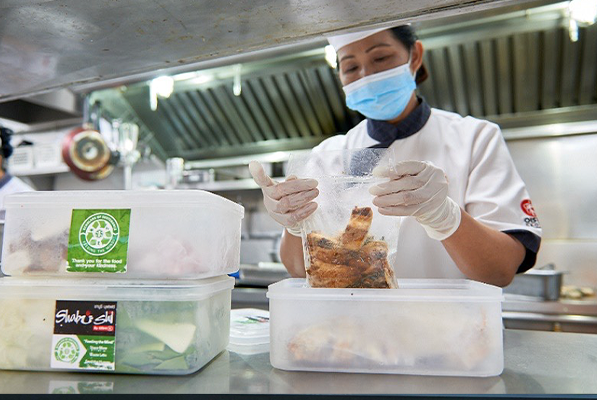ThaiBev collaborates with upstream and downstream partners to create innovative new products and programs to reduce food loss. Among these, the company’s key innovations are:
- Transforming vegetable waste into fertilizer
- Reusing bread crumbs and salmon waste in new food products
- Donating raw material waste to be used as animal feed
- Selling used oil to suppliers to produce biodiesel
Surplus food is donated directly to people living in disadvantaged circumstances. Currently, the QSR of Asia, or QSA, provides surplus food to 10 vocational institutes across Thailand, including Baan Metta (Nakhon Ratchasima Province), Baan Wangthong (Phitsanulok Province), Baan Rachawadee (Nonthaburi Province), Baan Maharaj (Pathumthani Province), and Baan Tubkwang (Saraburi Province). In 2023, KFC restaurants under QSA’s operations donated a total of 10,019.06 kilograms of high-quality food, representing a 58.55% increase over the previous year.
ThaiBev’s Food Product Group works with the SOS Foundation to donate food surplus to various vulnerable communities. The foundation works with restaurants to pick up food surplus (either raw or cooked) that is still of high quality and edible. Restaurants are given instructions on how to store the food – including whether containers are necessary, and what food categories are accepted – to ensure the safety of those receiving the food.
In 2023, a total of 3,255.79 kilograms of food surplus was donated, which is equivalent to 24,342 meals and is worth approximately 270,073 Baht
Mx Cakes&Bakery has collaborated with Yindii, one of the promising food rescuers in Thailand, to develop a pilot project to rescue the unsold cakes and bakery that are still in a good quality. The cakes and bakery will then be put in a surprise box and sold with a discount.
In 2023, a total of 250,819 customers participated in the Zero Food Waste Challenge and raised their awareness on the issue of food waste.
In late 2021, The Food group has started its collaboration with FEED Addition, ThaiBev Recycle (TBR), and HAVI to plan together the food loss and waste management project. This project will watch over all of the food loss and waste that the food group has as well as packaging waste and will holistically manage them starting from the production site to the end at the retail level to ensure that food loss and waste will not go to landfill. Moreover, instead of donating all of the food loss and waste, the food group is trying to create income out of its food loss and waste as well. This will be a collaborative work between the Food group and various stakeholders to find potential ways to earn revenues from food loss and waste that are supposed to be thrown away.



